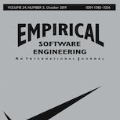Context: This work is part of a research project whose ultimate goal is to systematize theory building in qualitative research in the field of software engineering. The proposed methodology involves four phases: conceptualization, operationalization, testing, and application. In previous work, we performed the conceptualization of a theory that investigates the structure of IT departments and teams when software-intensive organizations adopt a culture called DevOps. Objective: This paper presents a set of procedures to systematize the operationalization phase in theory building and their application in the context of DevOps team structures. Method: We operationalize the concepts and propositions that make up our theory to generate constructs and empirically testable hypotheses. Instead of using causal relations to operationalize the propositions, we adopt logical implication, which avoids the problems associated with causal reasoning. Strategies are proposed to ensure that the resulting theory aligns with the criterion of parsimony. Results: The operationalization phase is described from three perspectives: specification, implementation, and practical application. First, the operationalization process is formally defined. Second, a set of procedures for operating both concepts and propositions is described. Finally, the usefulness of the proposed procedures is demonstrated in a case study. Conclusions: This paper is a pioneering contribution in offering comprehensive guidelines for theory operationalization using logical implication. By following established procedures and using concrete examples, researchers can better ensure the success of their theory-building efforts through careful operationalization.
翻译:暂无翻译




